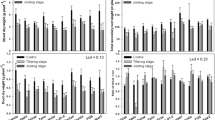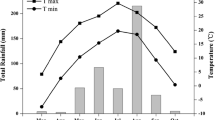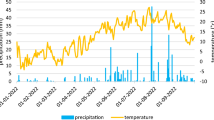Abstract
Maize is highly susceptible to waterlogging, which is becoming one of worldwide abiotic threats in many agricultural areas. This study was evaluated to establish the screening method and to find tolerant maize genotypes. Six Korean maize inbred lines were subjected to waterlogging at V3 for 15 days using a big size pot with single maize plant (big pot method) and a box containing 31 maize plants at a time (box method). The degree of foliar senescence and the number of senescent leaves were better indicators for selecting waterlogging tolerant maize genotypes than SPAD value and plant height. The degree of foliar senescence revealed that KS124, KS140, and KS141 are tolerant, and KS85 is susceptible to waterlogging at the early growth stage. These responses of foliar senescence were in clear accordance with those of plant grain yield, which was supported by stress tolerance index for grain yield. The box method also showed the similar response of foliar senescence to the big pot method. Therefore, this box method based on foliar senescence may be simple and efficient for large-scale screening of maize germplasm against waterlogging stress. It was concluded that foliar senescence can be a good indicator for selecting tolerant maize genotypes against waterlogging at the early growth stage.
Similar content being viewed by others
References
Campbell MT, Proctor CA, Dou Y, Schmitz AJ, Phansak P, Kruger GR, Zhang C, Walia H. 2015. Genetic and molecular characterization of submergence response identifies Subtol6 as a major submergence tolerance locus in maize. PLoS One 10(3): e0120385. doi: 10.1371/journal.pone.0120385
Chen Y, Chen X, Wang H, Bao Y, Zhang W. 2014. Examination of the leaf proteome during flooding stress and the induction of programmed cell death in maize. Proteome Sci. 12: 33
Jafari A, Paknejad F, Al-Ahmadi MJ. 2009. Evaluation of selection indices for drought tolerance of corn (Zea mays L.) hybrids. Int. J. Plant Prod. 3(4): 33–38
Kristin AS, Senra RR, Perez FI, Enriquez BC, Gallegos JA, Vallego PR, Wassimi N, Kelley JD. 1997. Improving common bean performance under drought stress. Crop Sci. 37: 43–50
Liu YZ, Tang B, Zheng YL, Ma KJ, Xu SZ, Qiu FZ. 2010. Screening methods for waterlogging tolerance at maize (Zea mays L.) seedling stage. Agric. Sci. China 9(3): 362–369
Lone AA, Warsi MZK. 2009. Response of maize (Zea mays L.) to excess soil moisture (ESM) tolerance at different stages of life cycle. Bot. Res. Int. 2: 211–217
Mano Y, Omori F, Takamizo T, Kindiger B, Bird RM, Loaisiga CH. 2006. Variation for root aerenchyma formation in flooded and non-flooded maize and teosinte seedlings. Plant Soil 281: 269–279
Moradi H, Akbari GA, Khorasani SK, Ramshini HA. 2012. Evaluation of drought tolerance in corn (Zea mays L.) new hybrids with using stress tolerance indices. Eur. J. Sustainable Dev. 1(3): 543–560
Mukhtar S, Baker JL, Kanwar RS. 1990. Corn growth as affected by excess soil water. Trans. Amer. Soc. Agr. Eng. 33, 437–442
Rao R, Li YC. 2003. Management of flooding effects on growth of vegetable and selected field crops. Hortic. Technol. 13, 610–616
Ren BZ, Zhang JW, Li X, Fan X, Dong ST, Liu P, Zhao B. 2014. Effects of waterlogging on the yield and growth of summer maize under field conditions. Can. J. Plant Sci. 94: 23–31
Ren B, Zhang J, Dong S, Liu P, Zhao B. 2016. Effects of Waterlogging on Leaf Mesophyll Cell Ultrastructure and Photosynthetic Characteristics of Summer Maize. PLoS ONE 11(9): e0161424. doi:10.1371/journal.pone.0161424
Rosenzweig C, Tibiello FN, Goldberg R, Mills E, Bloomfield J. 2002. Increased crop damage in the US from excess precipitation under climate change. Global Environ. Change 12, 197–202
Rosielli A, Hamblin J. 1981. Theorectical aspects of selection for yield in stress and non-stress environment. Crop Sci. 21: 943–946
Sarita B, Singh BB. 2002. Effect of waterlogging on growth, chlorophylls and saccharides content in maize genotypes. Ind. J. Plant Physiol. 7: 246–251
Shah NA, Srivastava JP, da Silva JAT, Shahi JP. 2012. Morphological and yield responses of maize (Zea mays L.) genotypes subjected to root zone excess soil moisture stress. Plant Stress 6(1):59–72
Wobus C, Lawson M, Jones R, Smith J, Martinich J. 2013. Estimating monetary damages from flooding in the United States under a changing climate. J. Flood Risk Manage. DOI: 10.1111∳r3.12043
Yan B, Dai Q, Liu X, Huang S, Wang Z. 1996. Flooding-induced membrane damage, lipid oxidation and activated oxygen generation in corn leaves. Plant Soil 179: 261–268
Zaidi PH, Maniselvan P, Sultana R, Yadav M, Singh RP, Singh SB, Das S, Srinivasan G. 2007. Importance of secondary traits in improvement of maize (Zea mays L.) for enhancing tolerance to excessive soil moisture stress. Cereal Res. Comm. 35: 1427–1435
Zaidi PH, Rafique S, Rai PK, Singh NN, Srinivasan G. 2004. Tolerance to excess moisture in maize (Zea mays L.): susceptible crop stages and identification of tolerant genotypes. Field Crops Res. 90: 189–202
Zaidi PH, Rafique S, Singh NN. 2003. Response of maize (Zea mays L.) genotypes to excess soil moisture stress: morpho-physiological effects and basis of tolerance. Eur. J. Agron. 19(3): 383–399
Zaidi PH, Singh NN. 2001. Effect of water logging on growth, biochemical compositions and reproduction in maize. J. Plant Biol. 28: 61–70
Author information
Authors and Affiliations
Corresponding authors
Electronic supplementary material
Rights and permissions
About this article
Cite this article
Shin, S., Kim, SG., Jung, GH. et al. Evaluation of waterlogging tolerance with the degree of foliar senescence at early vegetative stage of maize (Zea mays L.). J. Crop Sci. Biotechnol. 19, 393–399 (2016). https://doi.org/10.1007/s12892-016-0097-1
Received:
Revised:
Accepted:
Published:
Issue Date:
DOI: https://doi.org/10.1007/s12892-016-0097-1




